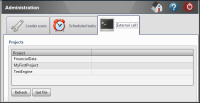Using External call
External call returns a credential security file for a project, as shown in
Figure 6‑7. The credential file allows you to run a project remotely, from a command prompt, or a batch file. Typically projects contain load and transformation instructions. You can control what instructions are executed from Data and Transform options in Projects management.
Figure 6‑7 Getting a project credential file
The credential file contains encrypted information about the current date and time, the project name, and security information associated with the system where the product is installed. This information includes security keys that the BIRT Loader installer generates and saves in this folder:
C:\Program Files\Actuate11SP4\BIRTAnalytics\dubnium\qloader
Public-key encryption uses two different mathematically related keys, known as a key pair, to encrypt and decrypt data. Information encrypted using one key can only be decrypted by using the other member of the key pair. The names of the keys are:

qloader.pbl
Public key, associated with the system where the product is installed

qloader.prv
Private key, used to decrypt the information encrypted with the public key
These files are only valid on the server where they are created. If these files are deleted, you can regenerate them by reloading the BIRT Loader web application to the Tomcat web server. Every time you reinstall the product, you must regenerate the load processes again.
The following activities are available:

Select project
A drop-down list of the projects the user accesses.

Get file
Generates a credential token for the selected project. This token is used to launch load processes remotely, or from batch files. By default, the project file name is callProject.tkn. You can change the name by choosing a name specific for a loading project.

